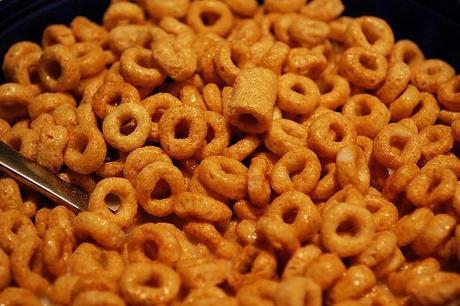
Chris Metcalf Flickr Creative Commons
WASHINGTON D.C., January 6, 2014—General Mills announced Thursday that original Cheerios will be made without genetically modified (GMO) ingredients. While environmentalists and activists are calling the move by the Minneapolis-based food giant a major victory, the change does not necessarily signal a shift in General Mills’ business practices regarding GMOs or GMO labeling.
According to a statement, General Mills has never used genetically engineered oats to make original Cheerios. However, it was previously using small amounts of sugar and cornstarch from GMO sources.
General Mills said Thursday that the change to non-GMO ingredients was made “many weeks ago” in response to consumer demand, and the new cereal boxes will begin to appear on store shelves as they make their way through the distribution chain.
New Cheerios boxes will contain a label stating “Not Made With Genetically Modified Ingredients.” This is not an official certification, however.
The change was prompted by the GMO Inside campaign, led by Green America, a green economy activist group. The campaign targeted Cheerios through social media, asking General Mills to eliminate GMO ingredients in the popular breakfast cereal.
“This is a big deal,” Todd Larsen, corporate responsibility director at Green America, said to USA Today. “Cheerios is an iconic brand and one of the leading breakfast cereals in the U.S. We don’t know of any other example of such a major brand of packaged food, eaten by so many Americans, going from being GMO to non-GMO.”
While there is little evidence that genetically modified foods have a negative impact on health, GMOs can be destructive to the environment. Genetically engineered seeds and crops encourage heavier use of chemical herbicides and pesticides that remain in the soil, air and water.
Heavier use of herbicides and pesticides also fosters the evolution of pests and weeds that are increasingly resistant to these chemicals. Environmentalists argue that these stronger, more resistant, faster growing organisms compete with other species to reduce biodiversity and destroy ecosystems.
While the switch to non-GMO original Cheerios is a victory for activists, it is a small one.
First, original Cheerios’ simple recipe made it relatively easy to switch to a non-GMO formula, since it only involved switching two minor ingredients. The change only affects original Cheerios, and not Honey Nut, Apple Cinnamon, or Multi Grain Cheerios. Even then, General Mills stated that the change required significant investment over almost a year.
General Mills did not announce any plans to phase out GMO ingredients in any of their other products.
“For our other cereals, the widespread use of GM seed in crops such as corn, soy, or beet sugar would make reliably moving to non-GM ingredients difficult, if not impossible,” General Mills said in a statement.
Second, it is highly unlikely that the move signals a change in General Mills’ long-established support of the GMO industry or it’s efforts to defeat GMO labeling ballot initiatives in several states. For example, General Mills contributed over $1.1 million to defeat Proposition 37 in California in 2012 alone, reports The Huffington Post.
Confirming that its position as a supporter of GMO foods and producers has not changed with the change in Cheerios, General Mills stated it still opposes state GMO labeling laws.
Finally, General Mill’s switch to non-GMO ingredients in original Cheerios will not affect the booming GMO industry. Experts calculate that 60 to 80 percent of processed foods sold in U.S. grocery stores contain genetically modified ingredients and nearly half of U.S. cropland is planted with genetically engineered crops.
On the other hand, several major companies have announced a move to non-GMO or GMO-labeled products. For example, in a similar move, Kashi Cereal, owned by Kellog’s, and Chipotle Mexican Grill have said that they are looking for ways to take GMOs out of their products. Whole Foods Market Inc. stated that by 2018 it will require all food in its stores containing GMO ingredients to be labeled to reflect this.
These small victories will be meaningless, however, if they reflect the practices of only a minority of businesses. They will also be pointless if companies change a small percentage of their products to grab headlines while their business practices remain unchanged.
“If time passes and General Mills hasn’t increased its commitment, then perhaps this was just for PR,” said Elizabeth O’Connell, director of the GMO Inside campaign.
Related articles:
- Frankenfoods: The debate over genetically modified (GM) foods
- GMO apples may be deregulated by the end of 2013
